Egyptian Activists
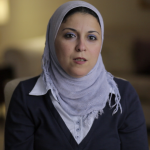
Esraa Abdel Fattah
Esraa Abdel Fattah is Vice-Chairman the Egyptian Democratic Academy. Abdel Fattah created the April 6 Strike Group on Facebook in March 2008 and organized a strike in support of workers in Mahalla al-Kobra that lead to her arrest and a sentence of two weeks in jail. The success of the strike, her arrest, and the size of the Facebook group she founded made Abdel Fattah a well-known figure throughout Egypt and among human rights activists. After being dubbed the social-networking phenom, “Facebook Girl,” she drew the attention of foreign media and some local newspapers that dared to resist the state’s censorship, turning her into an overnight symbol for resistance and resilience against corruption and injustice.
Abdel Fattah reappeared during the January 2011 nationwide protests in Egypt that called for the end of President Mubarak’s regime. Not only was she active on the internet, but also on the ground, updating Al Jazeera TV with the latest news related to the opposition. Abdel Fattah played a leading role in the mass protests in Tahrir Square and is a prominent spokesperson for the youth protest movement in Egypt. She was a major participant in the January 25th Egyptian Revolution and has recently founded the Free Egyptian Women Group, which seeks to empower women to participate in social and political activities and to hold leading positions in all fields. In June 2010, Abdel Fattah won the New Generation Democratic Activist Award from Freedom House, and she was recently named one of Arabian Business Magazine’s 100 most powerful Arab women.
Contact:
media.eda@egyda.org
www.egyda.org
@Esraa2008
Source: Esraa Abdel Fattah
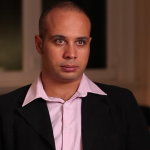
Ahmed Maher
Ahmed Maher is one of the co-founders of the April 6 Youth Movement in Egypt and a prominent participant in the anti-Mubarak demonstrations in Egypt in 2011. He is a civil engineer who works for a construction firm in New Cairo.
Maher was arrested in 2006 during a sit-in alongside judges protesting state interference with the judiciary. In March 2008, Maher and friend, Esraa Abdel Fattah, launched a Facebook group to promote a day of civil disobedience, calling for workers to stay home in protest against low wages and soaring food prices, scheduled for April 6, 2008. The group quickly grew to more than 70,000 members, evolving into the April 6 Youth Movement. Following the protest, Maher began planning another demonstration, targeting the date May 4, 2008 – President Hosni Mubarak’s 80th birthday. In retaliation for his involvement in organizing these demonstrations, Maher was arrested on May 7, 2008 in New Cairo. According to Maher, he was stripped and beaten while detained. Upon providing the (fake) password to his Facebook account, he was released the following morning. Maher was again arrested and released in late July after speaking to local and international media about his detention and torture at the hands of state security.
In June 2010, Maher helped organize a protest against the killing, by Egyptian police, of Khaled Said, a young resident of Alexandria. Maher has expressed support for the potential bid of Mohamed ElBaradei for the Egyptian presidency.
Contact:
+20102864919
info@6april.org
Source: http://en.wikipedia.org/wiki/Ahmed_Maher_%28youth_leader%29 and http://cyberdissidents.org/bin/dissidents.cgi?id=3&c=EG
Other Egyptian Activists
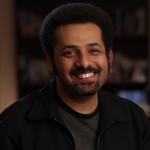
Wael Abbas
Wael Abbas is an internationally renowned Egyptian journalist, blogger, and human rights activist, who blogs at Misr Digital (Egyptian Awareness). He reported an incident of mob harassment of women, and broadcast several videos of police brutality. His actions led to the conviction of police for torture, but he has been harassed by the Egyptian government, and his accounts with YouTube and Yahoo were closed. YouTube has since restored his account and most of his videos. Facebook had deleted Wael’s account but it has since been restored.
Contact:
@waelabbas
Source: http://en.wikipedia.org/wiki/Wael_Abbas#cite_note-ICFJ-1
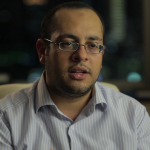
Ahmed Badawy
Ahmad Badawi was born in 1984 in Nasr City, a small suburb of Cairo. He graduated from Helwan University in 2007 with a degree in Electrical Power Engineering. He is now a liberal blogger and a member of the Egyptian Democratic Academy.
Badawi was imprisoned on April 6, 2008, following his participation in a protest in Cairo. Among many other topics covered in his blog, Badawi discusses the effects of living in a society where there is no freedom of speech. “I used to write freely what I feel and what I’m thinking about… now I feel like I’m watched, the people I want to talk about will read what I write here, they will not be happy when I say what is burning inside my heart and mind.”
Source: http://cyberdissidents.org/bin/dissidents.cgi?id=8&c=EG
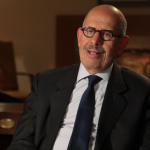
Mohamed ElBaradei
Dr. Mohamed ElBaradei is an Egyptian law scholar and diplomat. He was the Director General of the International Atomic Energy Agency (IAEA), an intergovernmental organization under the auspices of the United Nations, from December 1997 to November 2009.
From 1984, Dr. ElBaradei was a senior staff member of the IAEA Secretariat, holding a number of high-level policy positions, including Agency’s Legal Adviser and subsequently Assistant Director General for External Relations.
Dr. ElBaradei was born in Cairo, Egypt, in 1942, son of the late Mostafa ElBaradei, a lawyer and former President of the Egyptian Bar Association. He gained a Bachelor’s degree in Law in 1962 at the University of Cairo, and a Doctorate in International Law at the New York University School of Law in 1974.
He began his career in the Egyptian Diplomatic Service in 1964, serving on two occasions in the Permanent Missions of Egypt to the United Nations in New York and Geneva, in charge of political, legal and arms control issues. From 1974 to 1978 he was a special assistant to the Foreign Minister of Egypt. In 1980 he left the Diplomatic Service to join the United Nations and became a senior fellow in charge of the International Law Program at the United Nations Institute for Training and Research. From 1981 to 1987 he was also an Adjunct Professor of International Law at the New York University School of Law.
During his career as diplomat, international civil servant and scholar, Dr. ElBaradei has become closely familiar with the work and processes of international organizations, particularly in the fields of international peace and security and international development. He has lectured widely in the fields of international law, international organizations, arms control and the peaceful uses of nuclear energy, and is the author of various articles and books on these subjects. He belongs to a number of professional associations, including the International Law Association and the American Society of International Law.
In October 2005, Dr. ElBaradei and the IAEA were jointly awarded the Nobel Peace Prize for efforts “to prevent nuclear energy from being used for military purposes and to ensure that nuclear energy for peaceful purposes is used in the safest possible way.” In addition, he has received multiple other awards for his work. These include the International Four Freedoms award from the Roosevelt Institute, the James Park Morton Interfaith Award, and the Golden Plate Award from the Academy of Achievement. Dr. ElBaradei is also the recipient of a number of honorary degrees and decorations, including a Doctorate of Laws from New York University and the Nile Collar – the highest Egyptian decoration.
ElBaradei’s name has been circulated by opposition groups since 2009 as a possible candidate to succeed then President Hosni Mubarak in Egypt’s highest executive position. He joined protesters in Tahir Square during the 2011 revolution, but on January 14, 2012, ElBaradei declared he would not run for president.
Dr. ElBaradei is married to Aida Elkachef, an early childhood teacher. They have a daughter, Laila, and a son, Mostafa.
Contact:
@ElBaradei
Sources: Les Prix Nobel. The Nobel Prizes 2005, Editor Karl Grandin, [Nobel Foundation], Stockholm, 2006 and http://en.wikipedia.org/wiki/Mohamed_ElBaradei
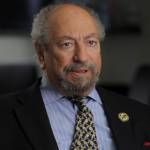
Saad Eddin Ibrahim
Saad Eddin Ibrahim is an Egyptian American sociologist and author. He is one of Egypt’s leading human rights and democracy activists, and a strong critic of former Egyptian president Hosni Mubarak.
Ibrahim is credited for playing a leading role in the revival of Egypt’s contemporary research-based civil society movement. For most of his professional career Saad Eddin Ibrahim was a professor of sociology at the American University in Cairo. He is the founder of both the Ibn Khaldun Center for Development Studies in Cairo and the Arab Organization for Human Rights. He is married to Barbara Lethem Ibrahim, director of the Gerhart Center for Civic Engagement and Philanthropy in Cairo. He is on the Board of Advisors to the Project on Middle East Democracy.
Well before his confrontations with the Egyptian government in the early 2000s, Ibrahim had become a controversial figure in Egypt. He reversed his earlier criticism of Anwar Sadat for his peace initiative with Israel. He gained the respect of Egypt’s human rights and civil society community for championing different causes, including Copts, Bahá’ís and other minorities at a time of rising sectarian tensions.
Ibrahim was arrested, imprisoned and prosecuted in 2000 for using European Union funds for election monitoring, and for allegedly defaming Egypt’s image abroad. He was sentenced to seven years in prison. His defense team countered that the real motives behind the government’s prosecution of Ibrahim and his assistants was his outspoken criticism of President Hosni Mubarak and his administration. He was tried twice on the same charges in State Security Courts, winning each time on appeal. During a third trial before the highest civil court in 2003, he was cleared of all charges and released, but not before a storm of international protest had put the Mubarak regime on the defensive.
As an independent-minded intellectual, Ibrahim has supported fair elections when they were viewed as incompatible with Egyptian politics, promoted international democratic alliances, and accepted NGO funding from any source that shares peaceful and democratic values, including those in the US. He has recently been under attack in the official press for calling on the U.S. Congress to condition its military aid to Egypt on improvements in the country’s human rights record and the freeing of another political prisoner, Ayman Nour.
In 2006 Ibrahim was awarded the Ion Ratiu Democracy Lecture Prize at the Woodrow Wilson International Center for Scholars, where he previously had been a public policy scholar. He is currently a Board member of the Arab Democracy Foundation.
Ibrahim taught sociology at Indiana’s DePauw University from 1967 to 1974. During the academic year 2008-2009, Ibrahim lived in the United States as a professor of political sociology at Indiana University and a visiting fellow at the Center for Middle Eastern Studies, Harvard University. Ibrahim is currently the Wallerstein Distinguished Visiting Professor at the Drew University Center on Religion, Culture & Conflict in Madison, New Jersey.
Become a fan:
@SaadEddinFans
Source: http://en.wikipedia.org/wiki/Saad_Eddin_Ibrahim
Egyptian Opposition Politician
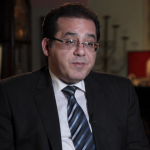
Ayman Nour
Egyptian politician, a former member of the Egyptian Parliament, founder of the El Ghad party and chairman of the Ghad El-Thawra Party. He was imprisoned in January 2005 by the government of President Hosni Mubarak and released on health grounds on February 18, 2009. Following the fall of Mubarak in the 2011 Revolution, Nour stated his intention to run for the vacant presidency.
Born on the 5th of December 1964, he started his political career as a student activist during high school and University. After graduating from Mansurah University Law School, he started his career in journalism in the ‘80s, in one of the most famous opposition newspapers called “El Wafd” after “El Wafd Party” the oldest liberal party in Egypt. He married Gamila Ismail, who was a TV presenter, a political activist and who became his spokeswoman later on.
After receiving his Ph.D. degree in “History of Law” from Russia in 1995, he ran and won in parliamentary elections as a member of the El Wafd party. Nour served in Parliament from 1995 – 2005), during which time he exposed many corruption cases, proposed a large number of laws, amended and monitored many International treaties which involved Egypt, stood against random laws, supported civil rights, visited many parliaments around the world and won many awards for his honorable parliamentary performance on both national and international levels.
He was re-elected for Parliament in 2000, announcing his intention for running for presidency after having 186 votes in the internal parliamentary elections (more than the third of the parliament, which was at this time the main condition for being a presidential candidate), but then one year later he was dismissed from “El Wafd” party, together with many of his colleagues in Parliament. Together they began establishing their own liberal political movement called “El Ghad,” i.e. “Tomorrow,” in 2003, which received its license from the government in 2004.
The Party then called for presidential elections instead of the old fashioned presidential referendum. Nour was soon accused of falsifying official documents related to “El Ghad” party. Nour’s parliamentary immunity was terminated and he was jailed. Days later, President Mubarak announced constitutional reforms that will allow other candidates to run in the 2005 elections against him. Nour submitted his nomination papers from inside the prison and the government released him to run. He came second to Mubarak in the elections, officially taking 8% of the vote.
After the presidential elections, Nour was put once again in jail in a trial described by many observers as an unfair trial under the control of a famous judge – the one who sent Dr. Saad el Din Ibrahim to prison few years before. He was sentenced for five years in prison for “knowing about the falsified papers.”
In February 2009, Nour was released from prison. After being set free, he launched a new campaign called “Knocking the doors” to complete the visits he had started in 2005 to Egyptian towns & cities, and even to millions of Egyptians living outside Egypt in Europe, the U.S. and in the Gulf region.
Contact:
@AymanNour
Sources: http://aymanoormasr.blogspot.com/2009/12/my-biography.html and http://en.wikipedia.org/wiki/Ayman_Nour
Former Egyptian President
Hosni Mubarak
Hosni Mubarak (in archive footage) is a former Egyptian politician and military commander. He served as the fourth President of Egypt from 1981 to 2011. Mubarak was appointed Vice President of Egypt in 1975, and assumed the presidency on October 14, 1981, following the assassination of President Anwar El Sadat. His almost thirty-year presidency made him Egypt’s longest-serving ruler since Muhammad Ali Pasha. Before he entered politics, Mubarak was a career officer in the Egyptian Air Force, serving as its commander from 1972 to 1975 and rising to the rank of air chief marshal.
Mubarak was ousted after 18 days of demonstrations during the 2011 Egyptian revolution when, on 11 February, Vice President Omar Suleiman announced that Mubarak had resigned as president and transferred authority to the Supreme Council of the Armed Forces. On April 13, 2011, Mubarak and both his sons were ordered to be detained for 15 days of questioning about allegations of corruption and abuse of power. He was then ordered to stand trial on charges of premeditated murder of peaceful protestors during the revolution. These trials officially began on August 3 2011. Egypt’s military prosecutors then also proclaimed that they are investigating Mubarak’s role in the assassination of his predecessor Anwar Sadat.
Source: http://en.wikipedia.org/wiki/Hosni_Mubarak
Expert Commentators
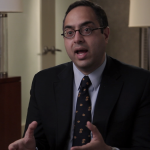
Tarek Masoud
Tarek Masoud is an assistant professor of public policy at Harvard University’s John F. Kennedy School of Government. A political scientist and Middle East specialist, his research focuses on political development in countries that are poor and unfree. He is particularly interested in the processes by which governments become more accountable to, representative of, and responsive to the needs of their people. He is the author of a forthcoming book on Islamic political parties, and is the co-editor of Problems and Methods in the Study of Politics(Cambridge, 2004) and Order, Conflict, and Violence (Cambridge, 2008), and his articles and reviews have appeared in the Journal of Democracy, Middle Eastern Law and Governance,Foreign Policy, and the International Journal of Middle East Studies, among others.
In 2009, Masoud was named a Carnegie Scholar by the Carnegie Corporation of New York, and was awarded the American Political Science Association’s Aaron Wildavsky Award for Best Dissertation in Religion and Politics. He is also the recipient of grants and fellowships from the National Science Foundation and the Paul and Daisy Soros Foundation. Masoud holds an AB with honors from Brown and received his Ph.D in political science with distinction from Yale in 2008.
Contact:
Phone: 617-496-3036
Email: Tarek_Masoud@harvard.edu
Twitter: @masoudtarek
Source: http://www.hks.harvard.edu/about/faculty-staff-directory/tarek-masoud
Other
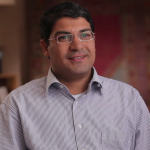
Hany Ibrahim
Hany Ibrahim is the co-founder of an Egyptian NGO, El-Mashreq Foundation for Development and Population and is the founder of the Resources for Development Center (RDC). For the past ten years, Ibrahim has worked with national and international organizations such as CARE International, Catholic Relief Services, and the International Republican Institute. In 2009, he was recognized as one of the Top Ten People Who Are Changing the World of Internet and Politics by PoliticsOnline and World E-Democracy Forum for his innovative online activities in the areas of voters’ education, peace building, and anti-corruption.
Hany holds an MA in public policy and administration from the American University in Cairo.
Source: http://draperhills.stanford.edu/docs/dhsfp_class_of_2010
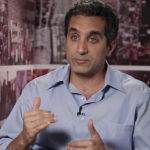
Bassem Youssef
Bassem Youssef is the host of a satirical comedy show in Egypt. He has been labeled “Egypt’s Jon Stewart” on Facebook and Twitter, which couldn’t please him more.
Contact:
@DrBassemYoussef
Source: http://www.thedailybeast.com/articles/2011/03/25/bassem-youssef-egypts-jon-stewart.html
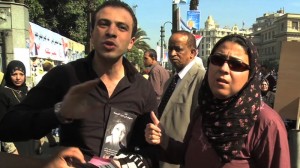
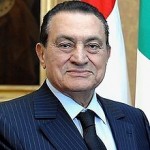
Hi Kate! Sorry we took so long to see your post! Thanks so much for attending the screening and writing about it! The film comes out on DVD and Digital download on April 16th!!! Very excited. Warmest wishes, Lynne